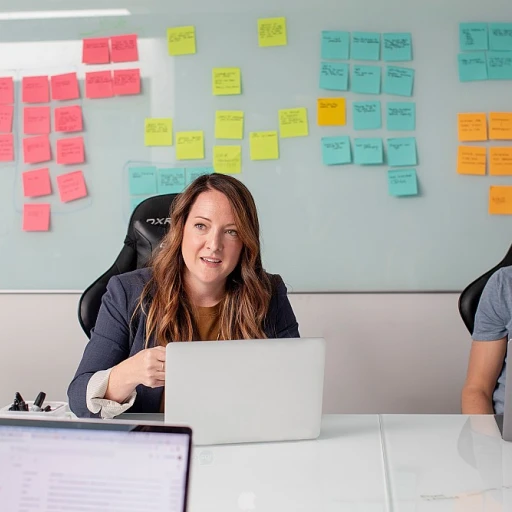
Understanding Motivational Interviewing
Delving into Motivational Interviewing
Motivational interviewing, a valuable tool in the world of career counseling, is rooted in guiding individuals through their decision-making processes. This technique emphasizes collaboration between the counselor and clients, focusing on exploring and resolving career-related dilemmas. The essence of motivational interviewing lies in its ability to facilitate intrinsic motivation to change by tapping into an individual's own desires and goals. At the heart of this technique is the intention to aid clients in resolving ambivalence and navigating the complexities of career development. Whether working with high school students or seasoned professionals, the approach is adaptable, fostering a supportive environment where clients feel empowered to make informed decisions. The counselor's role is integral, utilizing principles from social cognitive career theory and cognitive information processing (CIP) theory to guide the conversation. Techniques like reflective listening and strategic questioning are used to enhance the client's self-awareness and occupational knowledge, promoting a more profound understanding of their aspirations and challenges. Moreover, the motivational interviewing framework dovetails with established career counseling models like the CASVE cycle, which assists individuals in understanding and managing their career decision-making journey. By embracing motivational interviewing, counselors can provide a more personalized experience, addressing each client's unique cognitive processing style and enhancing their problem-solving capabilities. Navigating the vast array of career problems individuals face today, motivational interviewing offers a comprehensive approach. Facilitators act not just as counselors but as partners in the career development process, guiding clients towards meaningful and sustainable career decisions. For more insights on how these approaches can lead to significant roles like executive directors, explore the path to executive director roles in nonprofits. This exploration will provide additional context and understanding of the influence of motivational interviewing in complex career transitions.The Role of Motivational Interviewing in Career Counseling
The Integration of Motivational Interviewing in Career Counseling
Motivational interviewing offers a dynamic approach that can effectively enhance the traditional career counseling processes. By focusing on the client’s intrinsic motivations and supporting their exploration of career paths, counselors can facilitate a more personalized career development journey. Motivational interviewing, initially rooted in the realm of mental health, has carved a niche in career counseling by adopting techniques that encourage students and professionals to actively participate in their career decision-making process. This approach directly addresses common career problems such as uncertainty in choosing an occupational path or confronting cognitive barriers that prevent effective career problem solving. Incorporating social cognitive and cognitive processing theories, motivational interviewing assists clients in understanding their own ambivalence towards change. By considering the client's self-discrepancies and ambivalence, the counselor helps in expanding occupational knowledge and enhancing decision-making skills, crucial for successful life and career development. The flexibility of motivational interviewing allows it to be adapted to various settings, such as high school or adult career counseling, where school students and seasoned professionals alike can benefit from improved cognitive processing and career decision-making abilities. Techniques such as the CIP theory and the CASVE cycle are employed to address cognitive and occupational challenges in a structured manner, making it easier for clients to navigate through complex career decisions. This integration not only enables a more collaborative counselor-client dynamic but also empowers individuals to overcome dilemmas and catalyzes effective problem solving associated with career development. Ultimately, motivational interviewing supports the counselor’s role in minimizing resistance and amplifying readiness for change, resulting in more empowered and informed career decisions. For a deeper understanding of expanding women's leadership roles through career development, explore the impact of professional mentoring. This insight ties in with motivational interviewing as it emphasizes personal empowerment in professional settings, fostering leadership alongside career growth.Techniques and Strategies
Implementing a Client-Centric Approach
Motivational interviewing transcends typical counseling techniques, particularly in the domain of career development. To begin with, it emphasizes the use of a client-centric approach, empowering individuals to take ownership of their career decisions. By actively engaging clients in the decision-making process, counselors facilitate a more profound self-awareness that aids career problem-solving. This approach is particularly beneficial for school students and those at the onset of their professional lives, as it helps them navigate their career paths effectively.Utilizing the CASVE Cycle
Counselors may utilize specific frameworks such as the CASVE cycle, derived from the Cognitive Information Processing (CIP) theory, to further support clients in their career journey. CASVE stands for Communication, Analysis, Synthesis, Valuing, and Execution – a decision-making process that guides clients through analyzing careers and occupational knowledge, assessing their skills, and making informed choices. When integrated with motivational interviewing techniques, this cycle can help streamline career decision-making for both students and adults.Strategic Questioning and Reflective Listening
Strategic questioning forms the backbone of motivational interviewing, encouraging clients to articulate their thoughts and feelings around career change and development. This process, combined with reflective listening, enables counselors to gain insights into a client’s aspirations and potential barriers they might face in their career path. Counselors can help clients reassess their assumptions around career decisions, fostering a shift in their cognitive processing of career-related problems.Supporting Change through Theory-Driven Methods
Adopting social cognitive career theory techniques is another strategy within motivational interviewing. This involves understanding the interplay of personal choice in career making and the socio-cognitive obstacles that might impede progress. Counselors support clients in redefining career goals and overcoming challenges by helping them to develop self-efficacy and resilience in decision making. This approach underscores the adaptive nature of motivational interviewing and its importance in the dynamic landscape of career counseling today. Fixed vs. Group Mindset Training skills can further enhance this approach by equipping counselors and clients with the tools necessary for growth and change.Case Studies and Real-World Applications
Motivational Interviewing Strategies in Action
Motivational Interviewing (MI) has proven to be instrumental in career counseling through various practical applications and real-world scenarios. By incorporating MI, counselors effectively guide clients through the decision-making process, providing them with the tools necessary for informed career decisions. This section explores some noteworthy applications that highlight MI's effectiveness in career development. One prominent advantage of using MI in career counseling is its ability to facilitate change. Clients often face career problems that appear daunting, such as transitioning between jobs or shifting from school to work. By employing MI, counselors can help clients navigate these transitions. For example, high school students contemplating their occupational futures can benefit greatly from MI's focus on self-efficacy and decision making, elements grounded in social cognitive career theory.Integrating Cognitive Processing Models
Incorporating cognitive processing models, such as the CIP (Cognitive Information Processing) theory, compliments motivational interviewing techniques by offering a structured framework. The CASVE cycle—comprising Communication, Analysis, Synthesis, Valuing, and Execution—is particularly effective in helping clients work through career decisions. Counselors can use MI techniques to foster open communication and guide clients through each stage of the cycle, enhancing their decision-making skills and problem-solving proficiency.Real-World Applications in Counseling
A case study involving school students provides insight into the practical application of MI. Students facing career development choices may initially experience uncertainty. MI helps counselors motivate and guide these students, transforming hesitation into positive action. As students articulate their values and explore potential career paths, MI supports them in overcoming mental health barriers often associated with the decision-making process. Moreover, MI has been utilized effectively in adult career counseling. Clients who seek to change careers or reengage with work following a hiatus find value in MI's process-oriented approach. Counselors emphasize the importance of occupational knowledge by encouraging clients to explore diverse options and make reasoned, self-directed career decisions.Occupational Challenges and Counselor Interventions
Despite MI's versatility, counselors must remain cognizant of potential challenges. One issue is ensuring that clients do not feel overwhelmed by the career decision-making process. MI's empathetic and collaborative nature aids counselors in circumventing this problem by emphasizing goal setting and action planning. Furthermore, client engagement is critical in MI's success. It necessitates a counselor's adeptness at creating a supportive environment conducive to change. Only then can MI truly empower clients to make autonomous career decisions aligned with their life goals.Challenges and Considerations
Addressing the Complexities of Motivational Interviewing
Incorporating motivational interviewing into career counseling presents a unique set of challenges. As counselors work with clients, they must be adept at navigating the intricacies of this approach. The decision-making process is inherently complex, involving cognitive processing and problem-solving skills that can vary significantly among individuals. For instance, school students may face different career problems than those encountered by adults in occupational transitions.
Balancing Theory with Practice
One of the primary challenges is effectively integrating motivational interviewing theory with practical application. Counselors must be well-versed in the CIP theory and the CASVE cycle to guide clients through career decisions. This requires not only a deep understanding of career development theories but also the ability to adapt these theories to the individual needs of each client. Balancing theoretical knowledge with practical counseling techniques is crucial for fostering meaningful change.
Managing Resistance and Ambivalence
Clients often experience ambivalence when facing career decisions. This ambivalence can stem from a lack of occupational knowledge or cognitive dissonance about potential career paths. Counselors must employ motivational interviewing strategies to help clients articulate their concerns and work through their resistance. This involves creating a supportive environment where clients feel comfortable exploring their career aspirations and addressing any mental health issues that may impede their progress.
Ensuring Cultural Competency
Another consideration is the need for cultural competency in career counseling. Counselors must be sensitive to the diverse backgrounds and experiences of their clients. This includes understanding how social cognitive factors influence career decision-making and being aware of the unique challenges faced by different demographic groups, such as high school students or women in leadership roles. Tailoring motivational interviewing techniques to accommodate cultural differences is essential for effective counseling.
Continuous Professional Development
Finally, staying updated with the latest advancements in motivational interviewing and career counseling is vital. As new research emerges, counselors must be willing to adapt their methods and incorporate new insights into their practice. Engaging in continuous professional development ensures that counselors remain equipped to address the evolving needs of their clients and contribute to the future of career development.
Future of Motivational Interviewing in Career Development
Future Prospects in Career Development: A Dynamic Approach
The field of career development is rapidly evolving, and motivational interviewing continues to play a crucial role. As career counselors navigate complex decisions with clients, integrating motivational interviewing can facilitate positive occupational changes. This approach recognizes that career counseling is not just about providing information but about guiding clients through decision-making processes that align with their life goals.
With the increased recognition of mental health in career decisions, counselors are finding motivational interviewing indispensable. This technique encourages clients, including school students making career decisions, to explore their interests and values. By employing strategies like the cognitive processing and CASVE cycle, counselors can aid individuals in addressing career problems more effectively.
Looking ahead, the integration of motivational interviewing with career development will likely focus on:
- Emphasizing social cognitive career theory, aiding clients in making informed career choices.
- Improving career problem-solving skills through better occupational knowledge and decision-making strategies.
- Adapting strategies to individual needs, recognizing the diversity in school students and adult clients alike.
Career counseling's future is promising with motivational interviewing techniques. As the nuances of career development continue to unfold, these methods will remain pivotal in helping clients lead purposeful work lives.













